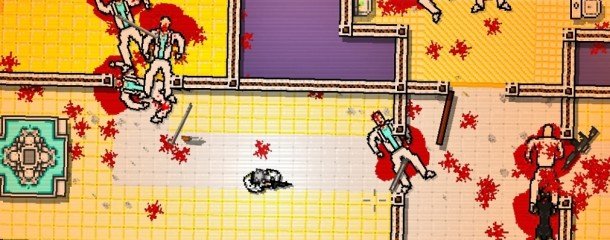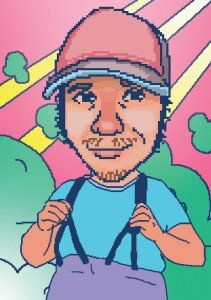Hotline Miami interview: Dennaton Games on creating carnage to delight and disgust

This article originally appeared in issue 247 of PC Gamer UK.
Among indie developers, Jonatan 'Cactus' Söderström is legendary for his freakish productivity. He frequently makes games in less than a day, usually by himself, and releases them for free. But while his creativity shows no signs of running dry, his bank account does. So now he's collaborated with artist Dennis Wedin on a larger game, one they can actually sell.
That's Hotline Miami, a brutally violent, psychedelic top-down shooter about ambushing gangsters with everything from assault rifles to scissors. At PCG we thoroughly enjoyed it, so I asked Jonatan and Dennis about the thinking behind Hotline and what's different about making a commercial game.
Do you intentionally work on ideas you can finish in a day, or do you just stop when you've had enough?
JS: I usually stop when it gets hard to push the idea further or doesn't feel like it's worth it to keep pushing. Some game concepts work a lot better if you keep them small and concentrated and would just get repetitive if you try to make something bigger from them.
I'll admit that I'm not always confident enough in my attention span to fully explore ideas that could potentially be made into something bigger and better.
Keep up to date with the most important stories and the best deals, as picked by the PC Gamer team.
What was the original idea for Hotline, why did you want to make it?
JS: My original idea, when I made the first prototype called Super Carnage, was just to make the goriest game I possibly could, with as many weapons as possible. I was only 18 at the time so it was a pretty silly and incomplete idea.
Then I remade it about a year later, this was after playing some of Ikiki's games and I really wanted to capture that feeling of always being outnumbered and having to master the controls and plan your actions to beat a level. I had to quit though, because I couldn't solve the pathfinding I needed for the AI. Then last winter I realised I was now able to do the whole thing without any technical problems, so I showed the old prototype to Dennis. He liked it a lot and started doing graphics for it before I knew it.

Has the pressure to make a living from it influenced the design at all?
JS: Yes, a little bit. One of a few things me and Dennis really wanted to avoid doing was a tutorial, but it eventually became clear that a lot of people stopped playing before really grasping the controls. So we eventually gave in and did our best to make it somehow fit into the game. I think you can tell from the tutorial dialogues we weren't really happy being forced to do this [laughs].
At the same time, we've worked very hard not to make any compromises. Most notably, the game's difficulty is still pretty high, and we worked really hard on finding the right songs for the soundtrack, and made sure we were able to license tunes from some relatively high profile bands like Coconuts and Sun Araw. Lately I've felt some pressure as I've started to run out of money completely, but Dennis has made sure we don't cut any corners.
DW: Things always work out in the end, so I made it clear that we shouldn't compromise anything because of deadlines. We have to make sure this is the best game we could possibly make, and I feel that this is just what we have done.
As for difficulty and people giving up, I think a lot of games hold the player's hands too much. Pointing out how to do everything and making sure there are sequences where the player almost dies but right as things start to look dire a healthpack appears. For me games that literally slap you in the face the first couple of times you play are the games that really make me want to go on!
Do you hope players will be disturbed by the violence? Does it matter if they're not?
JS: Yeah, we've thought a lot about the violence, and tried pretty hard to make it feel disgusting, brutal and harsh. The violence is a central theme to the game, the message behind the storyline is ultimately very related to it. In a sense it does matter to me if people aren't disturbed, but at the same time I can understand if not everyone will get what we're trying to say. I do hope no one will feel like we're trying to glorify hurting people after having played the game.
DW: At Gamescom a lot of people's first reaction was laughing at all the gore, but after a while they started to question themselves and why they reacted the way they did. I think that is what we are after. The dialogue asks several times things like “do you like hurting people?” and “why are you doing this?” I hope people really think about these questions when they play.
A good playthrough often ends up feeling a lot like a movie gunfight or massacre. Was that a goal?
JS: Yeah, we definitely wanted the game to make you feel a bit like the hero from an '80s action flick when you perform well... You are constantly forced into situations that seem impossible, but with some good reflexes, a little planning and a certain amount of trial and error you'll find yourself getting out of some really tight spots with bravado.
The game was released on the 23rd of October. To see what we thought of it, read our Hotline Miami review .

